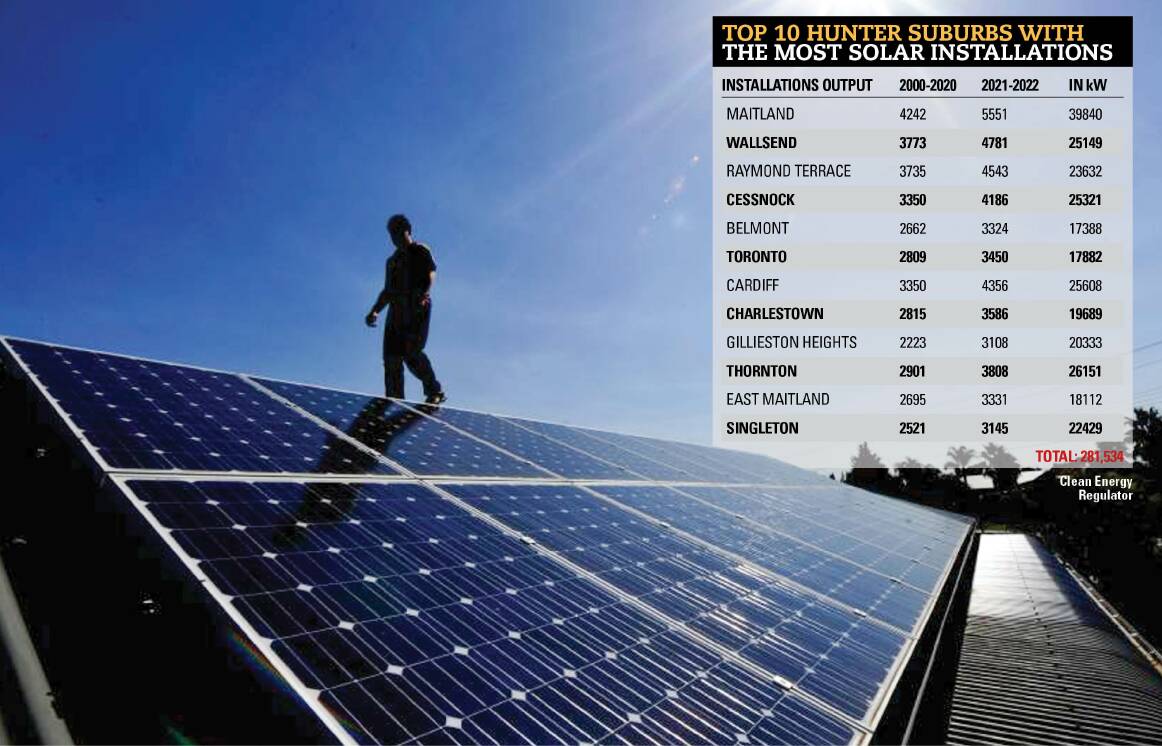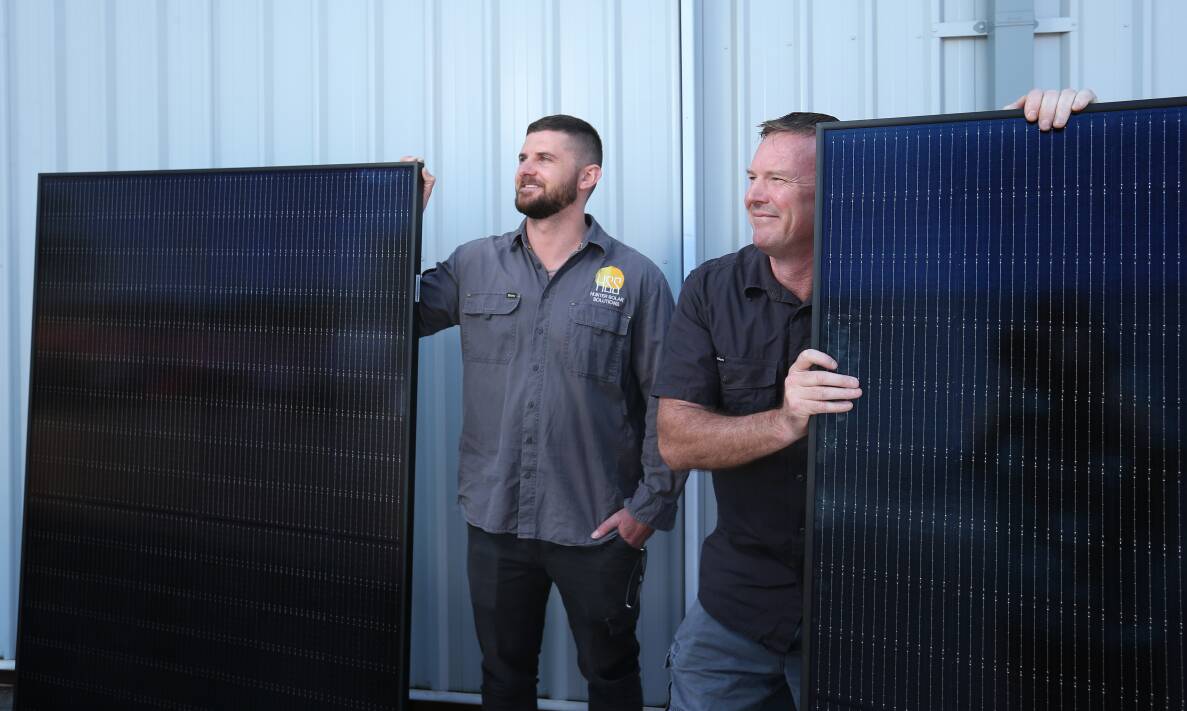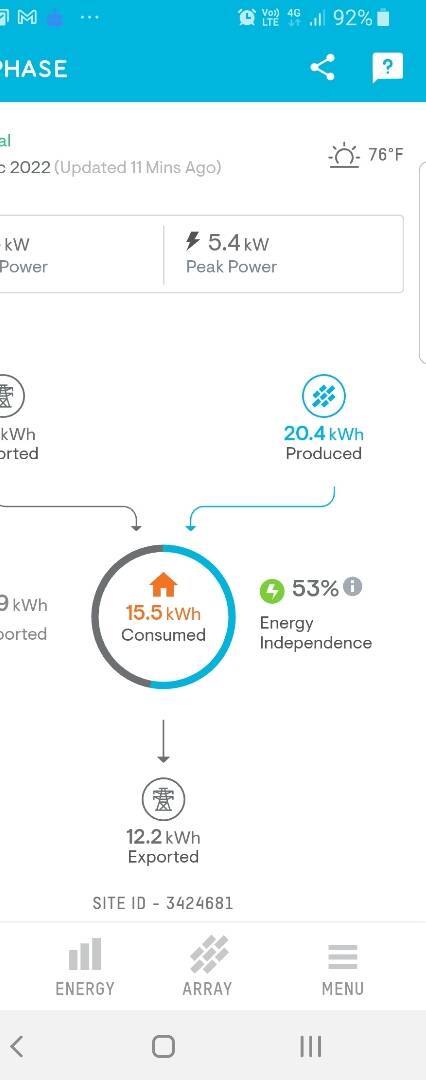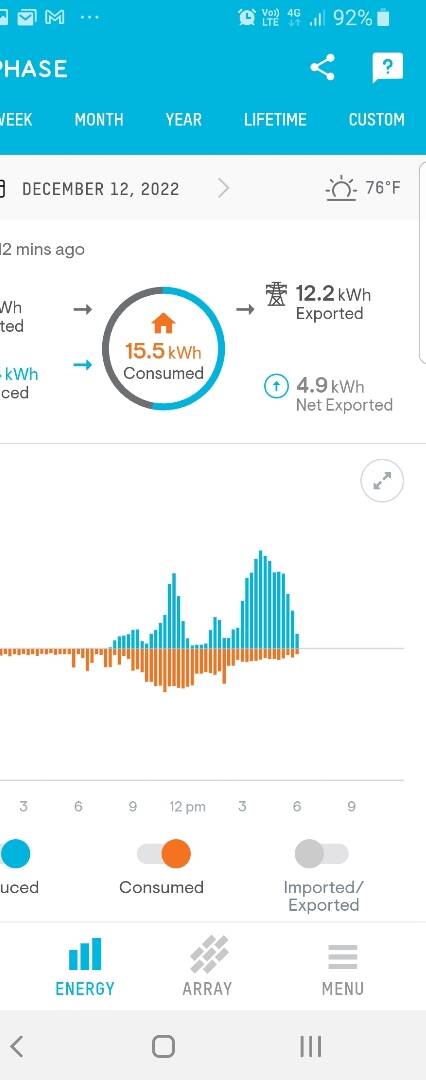
Hunter households installed rooftop solar and batteries at record rates in the past 18 months in an effort to offset spiralling power prices.
A postcode analysis of Clean Energy Regulator data shows the number of installations since 2021 in some areas was close to the number of installations that occurred in the two decades prior.
Gillieston Heights, Thornton, Maitland, Cardiff and Charlestown had the highest number of solar installations in the Hunter since 2021. The suburbs have the collective capacity to produce 131 megawatts of renewable energy, or about 6.5 per cent of the capacity of Liddell Power Station.
Nationally, the Clean Energy Regulator data shows 729 megawatts of small scale solar was installed in the August quarter.
"Increased installations of rooftop solar systems are happening off the back of an increase in retailer enquiries that began in July. If this trend continues, total capacity in 2022 will be about 2.7 gigawatts (GW)," CER chairman David Parker said.
"Looking ahead, Quarter 4 (2022) is typically the biggest quarter for rooftop solar and we also expect to see more of the larger commercial and industrial installations coming through.
"We also expect a big Quarter 4 for wind and solar power stations with approximately 1.5 gigawatts to start generating."

Additionally, installations of air source heat pumps have increased significantly, with 23,000 units installed in Q3 alone, compared to an average of 17,000 per year for much of the past decade.
"Households are switching from old, less efficient electric and gas hot water systems to newer and more efficient air source heat pumps to meet their energy needs," Mr Parker said.
The average cost of a high quality small-scale solar system presently costs about $10,000
The Clean Energy Regulator estimates if retail energy prices continue to increase at similar levels next year, the average payback period for a rooftop solar system could decline from about four years to three years.
Solar companies have reported a spike in inquiries, some by as much as 750 per cent, since the October 25 federal budget revealed electricity would jump 56 per cent and gas by 44 per cent over the next couple of years.

Hunter based solar installers confirmed the trends with most saying they were experiencing record demand.
"We're starting to book into April now. It's just crazy to be honest, we've never seen anything like it," Cardiff-based Hunter Solar Solutions co-owner Mick Geraeds said.
"Normally around this time we're hoping to have a good bit of work to go into the new year but we're trying to find extra dates and things like that to keep up with demand."
The main factor driving the demand was the skyrocketing cost of power.
"We are finding a lot of people are getting to a stage where they want to renew their system but without donut power prices are the main reason," Mr Geraeds said.
"With electricity prices expected to stay high I can't see that changing anytime soon."
He said customers are also putting a premium on longevity and on reliable customer service and manufacturer support for the lifetime of their solar system.
"We want to focus on quality and quality products because we want to achieve greater customer satisfaction. It's good for us and good for the customer," Mr Geraeds said.



The McIlwain family from Hamilton South invested in solar several months ago after watching energy prices gradually increase.
"It had been on the to-do list for a couple of years," Katherine McIlwain said.
"There was more information in the media about power prices increasing and, to be honest, there was an element of keeping up with the Joneses; we were the last house in our little plot to get solar."
The modular 7.8kilowatt system, which will probably pay for itself over five to six years, provides real-time updates about how much energy is being produced and exported. In addition it also gives a breakdown of each cell's performance.
Like many people who have installed a solar system in recent years, the McIlwains gave careful consideration to adding a battery.
Clean Energy Regulator data shows there were 27,651 small-scale batteries installed in Australia between 2021 and 2022 compared to 31,189 for the six years prior.
A typical small-scale battery now costs $10,000.
"We are selling a lot of Tesla batteries - the return on investment is a lot better than is used to be as the prices have come down. In addition, the buyback period from the suppliers isn't as great as it used to be. People are trying to store it rather than give it away.
Ms McIlwain said she was keen to build up some data on the family of four's electricity usage patterns to ensure they invested in the right type of and size of battery.
"We've changed how we run the pool filter and how when you run the dishwasher, when you do the loads of washing. We're trying to leverage the daylight hours for some of our consumption that we can shift around. From that you can assess what battery capacity will be useful for our current and potential future needs."
The solar technology has also prompted consideration of how it can complement future investments.
"We've got our pool configured for heating but it doesn't have anything installed but now an electric pump is a feasible option," Ms McIlwain said.
"We were running the bore water pump over the weekend so we're getting the water for free and the power for free as well."
WHAT DO YOU THINK? We've made it a whole lot easier for you to have your say. Our new comment platform requires only one log-in to access articles and to join the discussion on the Newcastle Herald website. Find out how to register so you can enjoy civil, friendly and engaging discussions. Sign up for a subscription here.







